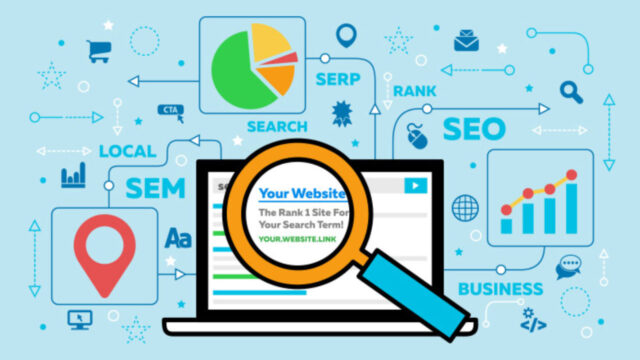In today’s digital landscape, local search engine optimization (SEO) is crucial for businesses looking to attract customers in their geographic area. With the rise of mobile searches and the increasing use of location-based queries, optimizing your website for local search can significantly enhance your visibility and drive foot traffic to your business. Here’s a comprehensive guide on how to optimize your website for local search engine rankings.

Table of Contents
Toggle1. Claim and Optimize Your Google My Business Listing
Google My Business (GMB) is a free tool that allows businesses to manage their online presence on Google:
- Claim Your Listing: If you haven’t already, claim your GMB listing. This will enable you to manage the information that appears when users search for your business.
- Complete Your Profile: Fill out all relevant fields, including your business name, address, phone number, website, business hours, and categories.
- Use Relevant Keywords: Incorporate local keywords in your business description to help improve your search visibility.
- Add High-Quality Images: Upload photos of your business, products, and services to enhance your listing and attract potential customers.
2. Optimize Your Website Content for Local Keywords
Keyword optimization is essential for improving your local search rankings:
- Conduct Keyword Research: Use tools like Google Keyword Planner or Ahrefs to identify relevant local keywords that potential customers are searching for.
- Include Local Keywords Naturally: Integrate these keywords into your website’s content, including titles, headings, meta descriptions, and body text.
- Create Location-Specific Pages: If you have multiple locations, consider creating separate pages for each one, optimized with location-specific content and keywords.
3. Enhance Your On-Page SEO
On-page SEO plays a crucial role in local search rankings:
- Optimize Title Tags and Meta Descriptions: Ensure your title tags and meta descriptions include local keywords and accurately describe the content on the page.
- Use Header Tags: Utilize header tags (H1, H2, H3) to structure your content and include relevant keywords for better indexing by search engines.
- Include NAP Information: Your website should prominently display your Name, Address, and Phone number (NAP) on every page, preferably in the footer.
4. Implement Schema Markup
Schema markup is a type of structured data that helps search engines understand the content of your website better:
- Use Local Business Schema: Implement schema markup specific to your business type (e.g., Local Business, Restaurant, Service) to provide search engines with critical information.
- Highlight NAP and Reviews: Ensure that your schema markup includes your NAP details, business hours, and customer reviews to enhance your visibility in search results.
5. Create Localized Content
Creating content that resonates with your local audience can significantly improve your search rankings:
- Write Blog Posts on Local Topics: Share news, events, and tips relevant to your community. This not only establishes your authority but also attracts local traffic.
- Feature Local Events and Partnerships: Promote local events or collaborate with other local businesses to create content that engages your audience.
- Encourage User-Generated Content: Invite customers to share their experiences with your business through testimonials or social media posts that you can showcase on your website.
6. Build Local Backlinks
High-quality backlinks can improve your website’s authority and search rankings:
- Collaborate with Local Influencers: Partner with local influencers or bloggers to promote your business and gain backlinks.
- Join Local Directories: List your business in local online directories such as Yelp, Yellow Pages, and local chamber of commerce sites.
- Sponsor Local Events: Consider sponsoring community events or charities, as this often leads to mentions and backlinks from local websites.
7. Encourage and Manage Customer Reviews
Customer reviews are critical for local SEO and can significantly influence potential customers:
- Ask for Reviews: Encourage satisfied customers to leave positive reviews on your Google My Business listing and other review platforms.
- Respond to Reviews: Engage with customers by responding to both positive and negative reviews, demonstrating your commitment to customer service.
- Showcase Reviews on Your Website: Highlight positive customer reviews on your website to build trust and credibility.
8. Optimize for Mobile Devices
With the increasing use of mobile devices for local searches, optimizing your website for mobile is essential:
- Responsive Design: Ensure your website is mobile-friendly and adapts to different screen sizes.
- Fast Loading Speeds: Optimize images and reduce unnecessary code to improve your website’s loading speed on mobile devices.
- Easy Navigation: Simplify your website’s navigation for mobile users to enhance their browsing experience.
9. Utilize Local Social Media
Social media can complement your local SEO efforts by increasing brand awareness and engagement:
- Share Local Content: Post updates, promotions, and local news on your social media channels to connect with your community.
- Engage with Local Audiences: Participate in local conversations and engage with other businesses and customers to build relationships.
- Promote Your Google My Business Listing: Encourage social media followers to leave reviews and engage with your GMB listing.
10. Monitor and Analyze Your Local SEO Efforts
Regularly monitoring your local SEO efforts can help you understand what’s working and where to improve:
- Use SEO Tools: Leverage tools like Google Analytics and Google Search Console to track your website’s performance and identify areas for optimization.
- Monitor Local Rankings: Keep an eye on your local search rankings for targeted keywords to measure your progress over time.
- Adjust Your Strategy: Based on your analysis, make necessary adjustments to your SEO strategy to improve your local search visibility continually.
Conclusion
Optimizing your website for local search engine rankings is essential for attracting customers in your area. By claiming and optimizing your Google My Business listing, enhancing on-page SEO, creating localized content, and building local backlinks, you can improve your visibility in local search results. Remember to engage with your audience through social media and customer reviews, and continuously monitor your performance to adapt your strategy for success. With the right approach, you can effectively position your business as a local authority and drive more traffic to your website.


No responses yet